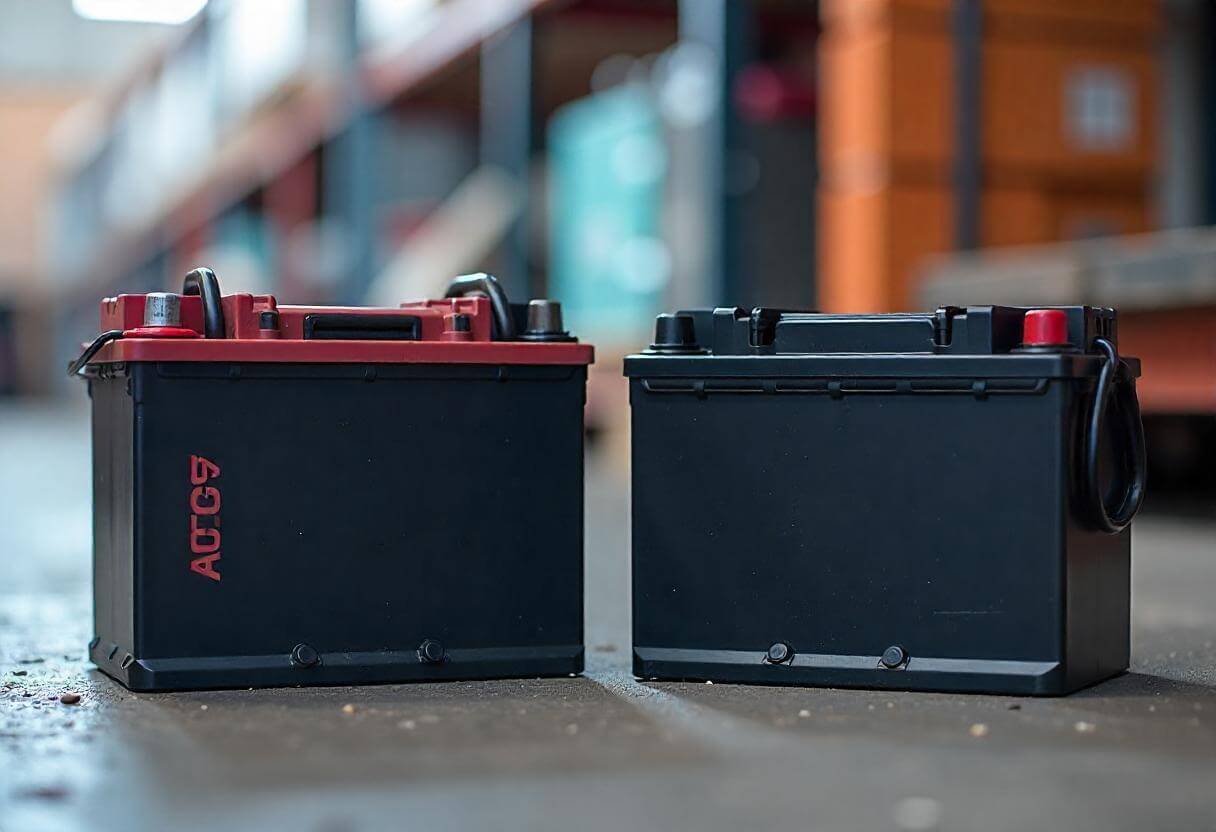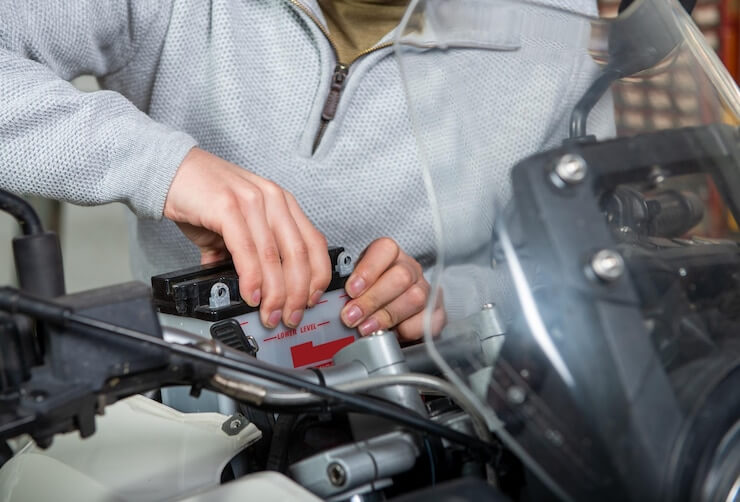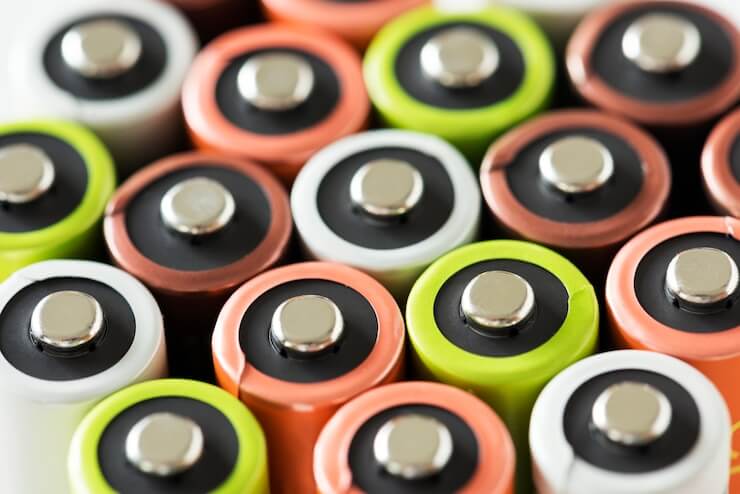What is the best battery to choose between Lead-Acid Batteries and AGM Batteries? Both AGM batteries and batteries are widely used in vehicles, boats, and industrial applications. They differ significantly in terms of cost, performance, and maintenance requirements. Selecting the right battery for your boat, vehicle, or off-grid system is crucial for optimal performance and longevity.
AGM batteries offer advantages like faster charging, spill-proof designs, and maintenance-free operation. Meanwhile, lead-acid batteries are cost-effective and provide reliable performance. Understanding the differences between these batteries will help you choose the right option to suit your needs.
What Are Lead-Acid Batteries?
Lead-acid batteries are one of the most widely used battery types, thanks to their affordability and simplicity. They are commonly found in motor vehicles, backup power systems, and solar energy setups. Their cost-effectiveness and straightforward construction make them a popular choice among consumers.
These batteries generate electricity through a chemical reaction between lead and sulfuric acid. Lead plates submerged in sulfuric acid create a reaction that produces electrical energy. This reaction is reversible, allowing the battery to be recharged multiple times.
What Are AGM Batteries?
AGM batteries, or Absorbed Glass Mat batteries, represent a more advanced type of lead-acid battery. In these batteries, fibre glass mats are positioned between the lead plates to absorb the electrolyte. This design ensures that the battery is spill-proof, durable, and highly efficient.
The structure of AGM batteries makes them more resistant to vibrations, a feature that enhances their safety and reliability. As a result, they are commonly used in applications such as aerospace, military vehicles, marine vessels, and motorcycles, where performance and safety are paramount.
Key Differences Between AGM and Lead-Acid Batteries
To determine whether AGM or lead-acid batteries are better for your needs, it’s essential to understand their major differences:
1. Performance: Capacity, Power Output, and Efficiency
- AGM Batteries: These batteries excel in performance, offering high power output, capacity, and efficiency. AGM batteries feature fast recharge capabilities and higher charge acceptance. They also have a longer lifespan and better energy retention compared to traditional lead-acid batteries.
- Lead-Acid Batteries: While reliable, lead-acid batteries have lower energy retention rates, shorter lifespans, and slower recharge times.
2. Maintenance Requirements
- AGM Batteries: These are maintenance-free, making them ideal for vehicles where the battery is located in hard-to-access areas, such as under seats or in the boot.
- Lead-Acid Batteries: Regular maintenance is required. They must be used in well-ventilated areas due to the release of gases and steam during operation.
3. Lifespan and Durability
- AGM Batteries: With a lifespan of 5–7 years, AGM batteries outlast their lead-acid counterparts. Their low discharge rate and durable design make them a dependable long-term option.
- Lead-Acid Batteries: These batteries typically last between 3–4 years, depending on usage and maintenance.
Advantages of AGM Batteries
1. Spill-Proof and Safer Design
AGM batteries are sealed, which reduces the risk of acid spills and eliminates the need for regular maintenance.
2. Enhanced Vibration Resistance
Thanks to their tightly packed glass mats and lead plates, AGM batteries are highly resistant to vibrations, ensuring reliable performance in challenging conditions.
3. Faster Recharge Rates
AGM batteries feature lower internal resistance compared to lead-acid batteries, allowing for faster recharge times and improved efficiency.
Advantages of Lead-Acid Batteries
1. Lower Upfront Costs
Lead-acid batteries are significantly cheaper than AGM batteries, making them an attractive option for budget-conscious buyers.
2. Availability and Wide Compatibility
Easily accessible and widely available, lead-acid batteries are simple to replace. This makes them a practical choice, particularly in remote locations or emergency situations.
Cost Comparison
When comparing AGM vs. Lead-Acid Batteries, factors like initial cost, energy efficiency, and lifespan should be considered.
- Cost: Lead-acid batteries are more affordable, costing one-third to one-half the price of AGM batteries. However, their shorter lifespan and higher maintenance requirements may result in higher overall costs in the long term.
- Lifespan: AGM batteries last 8–10 years, whereas lead-acid batteries typically last 3–6 years, depending on usage.
- Energy Efficiency: AGM batteries are more energy-efficient, delivering 2–4% more energy compared to lead-acid batteries.
Environmental Impact
Both AGM and lead-acid batteries are recyclable, adhering to Australian standards for battery recycling. This process helps recover valuable materials and minimises environmental harm.
AGM batteries are more sustainable due to their long lifespan and maintenance-free design, which reduces waste. While their production has a higher initial environmental impact, this is offset by their durability and efficiency over time.
When to Choose AGM Over Lead-Acid?
AGM batteries are the preferred choice in several scenarios:
- High-Performance Vehicles: Ideal for motorcycles, cars, and boats due to their high power output and ability to handle heavy loads.
- Deep Cycle Applications: Perfect for electric golf carts, solar power systems, and marine applications that require repeated deep discharges.
- Safety-Critical Applications: The spill-proof design makes AGM batteries suitable for emergency lighting, backup power, and medical devices.
- Off-Road Vehicles: Their vibration resistance and durability make them a reliable choice for rough terrains.
- High-Demand Applications: AGM batteries’ fast-charging capabilities are essential for applications requiring quick recharge times, such as emergency power systems.
When to Choose Lead-Acid Over AGM?
Lead-acid batteries are a more suitable option in the following cases:
- Budget-Conscious Applications: These batteries are ideal for small engines, lawnmowers, and general-purpose applications where cost is a priority.
- Extended Run Times: Their higher capacity makes them suitable for long-distance travel or off-grid power systems.
- Wide Availability: Lead-acid batteries are easy to find and replace, particularly in remote areas.
AGM vs. Lead-Acid Batteries in Australian Conditions
In Australia’s diverse climate, AGM batteries outperform lead-acid batteries:
- Cold Weather: AGM batteries are resistant to freezing, making them reliable in colder temperatures. In contrast, lead-acid batteries may freeze, causing permanent damage.
- Hot Weather: AGM batteries are less sensitive to high temperatures, ensuring consistent performance. Lead-acid batteries, however, are prone to damage in extreme heat.
- Vibration Resistance: AGM batteries are ideal for off-road and marine applications, making them a favourite among Australian drivers.
Expertise of Batteries Sunshine Coast
At Batteries Sunshine Coast, Peter and the team provide expert guidance to help you select the right battery for your needs. With years of experience, they offer personalised recommendations and ensure optimal battery performance and longevity.
As proud supporters of Australian-made products, their high-quality battery systems are locally sourced, promoting sustainability and supporting the local economy. This commitment to quality and service makes them a trusted partner for reliable battery solutions.
Conclusion
Both AGM and lead-acid batteries have their advantages and drawbacks. Lead-acid batteries are affordable and suitable for basic applications but require regular maintenance. AGM batteries, on the other hand, offer superior durability, performance, and maintenance-free operation, albeit at a higher cost.
When choosing between AGM vs. Lead-Acid Batteries, consider your application requirements, budget, and maintenance preferences. If you’re ready to upgrade your battery, contact Batteries Sunshine Coast for expert advice and installation services.





